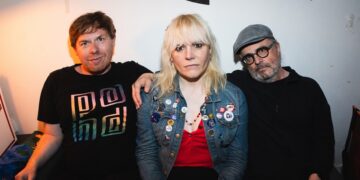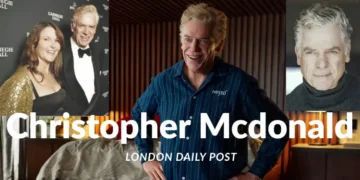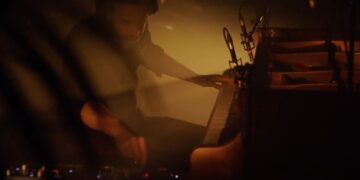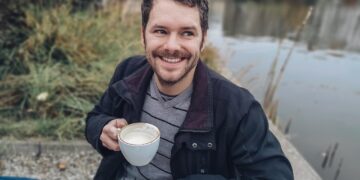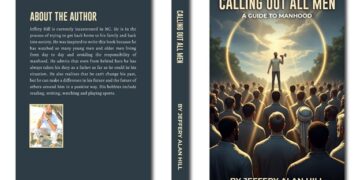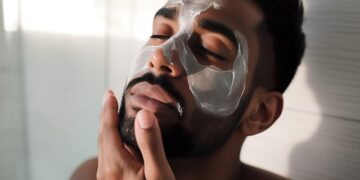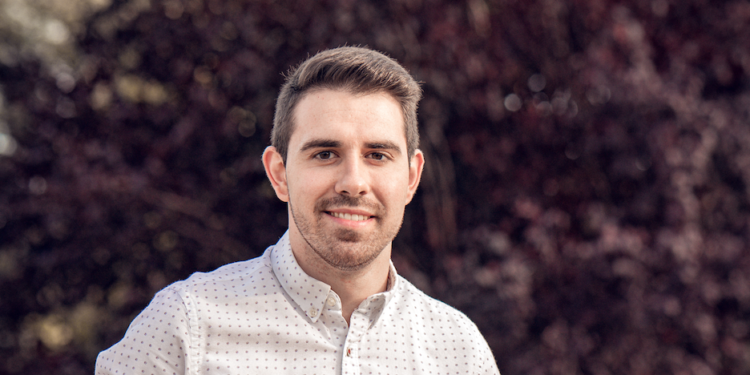Can you share a bit about your background and journey as a writer/director?
A: Since a very young age, I became interested in stories to the point of wanting to dedicate myself to telling them and considering myself a “collector of stories.” I always followed my passion and kept writing every kind of text, from small ones to play scripts. In 2022, I published my first novel (‘Sonrisas maquilladas’), which is the beginning of a trilogy. That encouraged me to jump to the next level and merge my creative writing with my other passions: Film and TV.
I came to Los Angeles to study “Entertainment Studies” at UCLA Extension and improve my skills. I enjoyed it a lot and gained knowledge and self-motivation to follow up on my career. During the process, I met a lot of interesting people who became my friends.
Finally, through networking, hard work, and perseverance, I shot two short films in 2023 as a writer/director. The first one, titled ‘The Last Moment’, has won several awards within the Film Festival Circuit. The second one, titled ‘How Can I Help You?’, is currently in Post-Production.
Now, I’m working on two feature films that I have ahead as a writer/director.
What inspired you to pursue a career in filmmaking and storytelling?
A: Storytelling is a powerful tool to move feelings. It’s a creative work whose goal is to present a chain of events in an attractive, emotional way to touch the audience’s hearts. And I love that.
I consider it my passion and that’s why I started from a young age to create my own stories and to listen to others’ ones. Crafting entire universes, characters we empathize with, or storylines that resonate with us is what I wanted to do. At the end of the day, stories have been the driving force of our societies for centuries and I consider them an amazing and exciting matter.
I immerse myself in that atmosphere when I read a book or watch a movie. It’s inspiring and emotionally rewarding and I love contributing to others with my stories.
How would you describe your unique style or approach as a writer/director?
A: Poignant, thoughtful, and sincere.
All my stories are centered around feelings. I like to dive into a specific topic and wrap it with emotions and reflecting moments so the audience can stop and think about their lives and the society in which they live. I craft the narrative from the heart. I want to be honest with the audience and open up to them about what I feel. Every storyteller adds personal elements to their work but, in my case, I opt to draw up the story according to my beliefs. I think this is a way to connect with the audience so they can embrace the truthfulness of the creator.
Additionally, I’m a very detail-oriented person and all my stories are full of details. You can find big meanings in small elements.
Can you highlight some of your notable works or projects that you are particularly proud of?
A: Every project is special in a certain way. But I’m very proud of my first novel,’Sonrisas maquilladas’, published in 2022. It’s a story full of heart and sincerity. Because it’s written in the first person, we can feel what the protagonist, Marcus, feels. We are witnesses of his constant battle between his heart and brain and, inevitably, we take part in it.
It was an ambitious project I wanted to jump into, especially because it’s the beginning of a trilogy and its magnitude and complexity. I put all effort and dedication into the story and, finally, I achieved it successfully.
Other projects I’m proud of are the two short films I shot in 2023: “The Last Moment” and “How Can I Help You?” Both are different in terms of genre and work time but I enjoyed them since the beginning.
What themes or topics do you find most compelling to explore in your storytelling?
A: I always felt appealed to psychology and the understanding of human nature. I love to create characters with a complex, deep-inside world so we can dive into their personalities and get some insights. This also helps to conceive a vision of the erratic behavior of humans and how difficult is to understand it.
Other topics I want to explore are self-consciousness and our capacity to overcome adverse situations; mysteries and hidden secrets over the history of humanity combined with some documented conspiracy theories; goodness and evilness; an exploration of true events, either historical or just from anonymous people whose story is compelling enough, and much more.
How do you typically come up with ideas for your projects?
A: I normally take inspiration from movies, documentaries, TV shows, books, and news. Also, traveling, meeting new cultures, meeting new people, and listening to others’ stories gives me a profound sense of what I want to tell. Then, I choose some captivating aspects from those and I start creating a narration around a specific concept.
Could you discuss any challenges you’ve faced in your career and how you overcame them?
A: There are many challenges to overcome every day, especially in the film industry. In this sector, there are many people involved and many creative and logistical procedures to tackle.
One of the biggest challenges is getting the work finished in a short amount of time. Sometimes, you only have a few days to come up with something new or to solve a crucial aspect to go on with a project. Especially in the production phase, the pace is frenetic. To calm down and organize yourself efficiently is a good way to accomplish this.
Another challenge is to get used to new teams and their way of working. Everyone has his/her method of doing something and you need to understand how they work to adjust to them or vice versa. Communication is a powerful tool to get the desired understanding of different methodologies.
Are there specific filmmakers or writers who have influenced your work?
A: Indeed. Everyone has a person who serves as an inspiration to follow.
In my case, directors such as Christopher Nolan, Steven Spielberg, Tim Burton, James Cameron, Wes Anderson, Ridley Scott, Pedro Almodóvar, J. A. Bayona, Álex de la Iglesia or Alejandro Amenábar inspired me.
On the writing side, Shakespeare, Charles Dickens, George Orwell, Agatha Christie, Miguel de Cervantes, and Federico García Lorca. More contemporary ones; Stephen King, Roahl Dhal, Eduardo Mendoza, and, especially, Carlos Ruiz Zafón.
Can you walk us through your creative process, from concept to the final production?
A: My process starts with a concept that resonates with me. I always ask myself: what do I want to tell? Once I have cleared that, I go on with the documentation phase. This implies searching for information, watching documentaries and movies related to that topic, etc. During this process, I compile the most relevant, accurate information and the most captivating scenes I see in fiction and mull over the creation of the atmosphere of my story. I usually come up with a first draft of it. I start with the characters who are the ones to carry on the narrative and I surround them with places, tone, etc.
Having all these elements on a whiteboard or a notebook, the moment of writing comes. I let myself flow and write all that comes from me without filters. Once I have it, I let it rest for three or four days and then I review it entirely. This helps me to tackle the story with a refreshed mind. This is the moment when I make some changes, and polish the grammar and little details.
Normally, while writing the story (in this case a script) I have a clear notion of the characters’ look, the different sequences, and the tone. It helps when I discuss the project with other team members and communicate my vision.
This is my creative process. Every person has their methodology and there is no one better than the other. The important point is that you, as a creative, know your project from the top to the bottom and have certainty of your vision.
In the rapidly evolving world of film and storytelling, what trends or changes do you find most interesting or challenging?
A: I find CGI and its breakthrough in the film industry a great tool to enhance a movie. It adds lots of possibilities in creating universes. But, as with every technology, its use has to be controlled. I don’t like those movies made entirely by CGI. They feel so unrealistic and poorly creative. I opt for a balance in which my limit is “realism.” All that can be made in real through makeup, hairstyling, production design, etc. and it feels credible on screen, is welcome. Any other elements that are hard to make through this process and can affect the credibility or realism of, CGI brings this.
Do you have any advice for aspiring writers/directors looking to make their mark in the industry?
A: In my case, perseverance is the key. If you have a goal in mind, go and pursue it.
Don’t give up and keep writing, even if you think the story is not good enough. Exploring new narratives and finding your voice is crucial for a writer/director. Take your time to do so.
Don’t wait to be 100% ready because no one is. The point is that you dare to do it and jump into the unexplored. You will discover you can do more than you think and have hidden capacities you didn’t know.
You don’t need to know everything. This industry is a constant school for everyone, even for the most experienced ones. You will learn through the process and experience. What matters is to be present and willing to be involved.
And lastly, but the most important point for me, is to stick to your beliefs, be self-confident, and be you. Write for you and make movies for you. If you don’t believe in your projects, why the audience will do it? Passion is contagious, and if you put all of yourself into a project, it will have a heart that people will feel.
How do you balance the creative and practical aspects of filmmaking in your projects?
A: When I write a script I also think about the logistical necessities to achieve it. Sometimes you need to adjust a story according to the scale of the project and be realistic about some scenes. There are multiple options when writing and I combine creative and practical thinking to get powerful sequences but not hard to make them in production.
Another aspect that happens in my writing phase is that I envision the scenes very clearly and have an idea about how to tackle them from a technical point of view. This helps to have a stronger vision as a director of what you want the film to look like. It’s easier to communicate this to the Director of Photography and discuss shots, angles, perspectives, etc.
You don’t need to know this technical stuff as a writer/director mandatorily. The important point is to have a vision of the project and to communicate what you want to the team to get the movie made. But, of course, if you also have some technical knowledge and your vision also expands to the visual, it helps to strengthen the idea.
Are there particular genres or types of stories you are eager to explore in the future?
A: I’m particularly interested in diving into real cases and real people. I want to write and tell stories based on true events apart from pure fiction.
I’m also open to making documentaries and exploring new cultures.
In fiction, I would like to make an action movie. I’m aware that this implies a big budget but I already have an idea for a feature script and I hope I can finally make it in the future.
How do you approach collaboration with other creatives, such as actors and cinematographers?
A: This primarily happens through networking. I meet people in projects and there we share our ideas. Sometimes you connect with some of them and talk about working in the future.
Another important moment is when casting. I have enjoyed casting talented actors and bringing them to a specific project.
Depending on the moment and situation, you can get in touch with people you already know or find new talent out there. Both options have something in common: you always learn from others’ talents.
What do you hope audiences take away from your work?
A: To reflect on their own lives and the society we live in.
I like to write grounded stories, with deep characters and profound themes. Every piece spins around a certain topic, primarily human being, their emotions, and behaviors.
Apart from entertaining, I love to tell stories with a message. Of course, as art, there are multiple interpretations. But if the audience stops and reflects on the story and they are aware of their lives and feelings, they relate with the characters, and dare to think out of the box, I would be more than happy.







